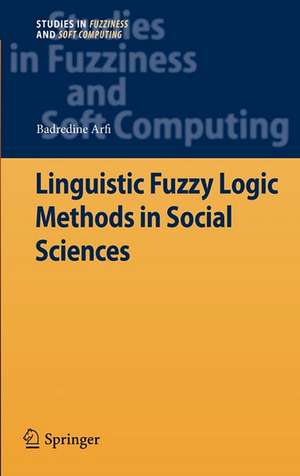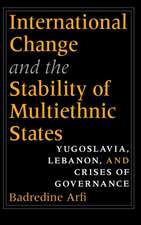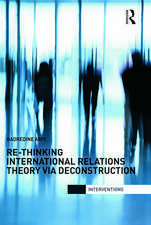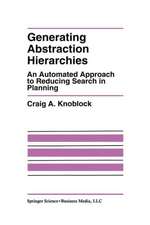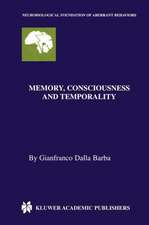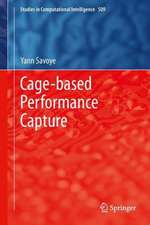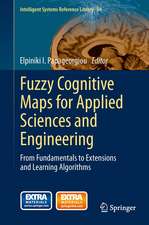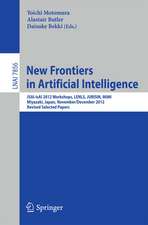Linguistic Fuzzy Logic Methods in Social Sciences: Studies in Fuzziness and Soft Computing, cartea 253
Autor Badredine Arfien Limba Engleză Hardback – 19 iun 2010
| Toate formatele și edițiile | Preț | Express |
|---|---|---|
| Paperback (1) | 640.84 lei 6-8 săpt. | |
| Springer Berlin, Heidelberg – 13 noi 2014 | 640.84 lei 6-8 săpt. | |
| Hardback (1) | 647.13 lei 6-8 săpt. | |
| Springer Berlin, Heidelberg – 19 iun 2010 | 647.13 lei 6-8 săpt. |
Din seria Studies in Fuzziness and Soft Computing
- 20%
 Preț: 999.85 lei
Preț: 999.85 lei - 20%
 Preț: 653.06 lei
Preț: 653.06 lei - 20%
 Preț: 872.98 lei
Preț: 872.98 lei - 20%
 Preț: 930.57 lei
Preț: 930.57 lei - 20%
 Preț: 1051.00 lei
Preț: 1051.00 lei - 20%
 Preț: 992.44 lei
Preț: 992.44 lei - 20%
 Preț: 655.85 lei
Preț: 655.85 lei - 20%
 Preț: 1001.86 lei
Preț: 1001.86 lei - 18%
 Preț: 954.14 lei
Preț: 954.14 lei - 20%
 Preț: 330.10 lei
Preț: 330.10 lei - 20%
 Preț: 333.04 lei
Preț: 333.04 lei - 20%
 Preț: 997.56 lei
Preț: 997.56 lei -
 Preț: 391.61 lei
Preț: 391.61 lei - 20%
 Preț: 647.79 lei
Preț: 647.79 lei - 20%
 Preț: 986.01 lei
Preț: 986.01 lei - 18%
 Preț: 958.56 lei
Preț: 958.56 lei - 20%
 Preț: 996.40 lei
Preț: 996.40 lei - 20%
 Preț: 999.35 lei
Preț: 999.35 lei - 15%
 Preț: 646.43 lei
Preț: 646.43 lei - 20%
 Preț: 651.57 lei
Preț: 651.57 lei - 20%
 Preț: 997.89 lei
Preț: 997.89 lei - 15%
 Preț: 641.03 lei
Preț: 641.03 lei - 20%
 Preț: 1009.74 lei
Preț: 1009.74 lei - 20%
 Preț: 992.62 lei
Preț: 992.62 lei -
 Preț: 388.72 lei
Preț: 388.72 lei - 18%
 Preț: 1223.43 lei
Preț: 1223.43 lei - 20%
 Preț: 651.42 lei
Preț: 651.42 lei - 18%
 Preț: 951.59 lei
Preț: 951.59 lei - 18%
 Preț: 948.61 lei
Preț: 948.61 lei
Preț: 647.13 lei
Preț vechi: 808.91 lei
-20% Nou
Puncte Express: 971
Preț estimativ în valută:
123.84€ • 128.82$ • 102.24£
123.84€ • 128.82$ • 102.24£
Carte tipărită la comandă
Livrare economică 15-29 aprilie
Preluare comenzi: 021 569.72.76
Specificații
ISBN-13: 9783642133428
ISBN-10: 3642133428
Pagini: 270
Ilustrații: XVI, 185 p.
Dimensiuni: 155 x 235 x 20 mm
Greutate: 0.46 kg
Ediția:2010
Editura: Springer Berlin, Heidelberg
Colecția Springer
Seria Studies in Fuzziness and Soft Computing
Locul publicării:Berlin, Heidelberg, Germany
ISBN-10: 3642133428
Pagini: 270
Ilustrații: XVI, 185 p.
Dimensiuni: 155 x 235 x 20 mm
Greutate: 0.46 kg
Ediția:2010
Editura: Springer Berlin, Heidelberg
Colecția Springer
Seria Studies in Fuzziness and Soft Computing
Locul publicării:Berlin, Heidelberg, Germany
Public țintă
ResearchCuprins
Linguistic Fuzzy-Logic and Computing with Words.- Elements of Linguistic Fuzzy-Logic and Framework.- Linguistic Fuzzy-Logic Decision-Making Process.- Linguistic Fuzzy-Logic 2x2 Games.- Linguistic Fuzzy-Logic Social Game.- Linguistic Fuzzy-Logic and Causality.- Linguistic Fuzzy-Logic Data Analysis.- Conclusion.
Textul de pe ultima copertă
The book, titled “Linguistic Fuzzy-Logic Methods in Social Sciences,” is a first in its kind. Linguistic fuzzy logic theory deals with sets or categories whose boundaries are blurry or, in other words, “fuzzy,” and which are expressed in a formalism that uses “words” to compute, not numbers, termed in engineering as “soft computing.” This book presents an accessible introduction to this linguistic fuzzy logic methodology, focusing on its applicability to social sciences. Specifically, this is the first book to propose an approach based on linguistic fuzzy-logic and the method of computing with words to the analysis of decision making processes, strategic interactions, causality, and data analysis in social sciences. The project consists of systematic, theoretical and practical discussions and developments of these new methods as well as their applications to various substantive issues of interest to international relations scholars, political scientists, and social scientists in general.
Caracteristici
Pioneering book demonstrating the analytic power of the combination of linguistic fuzzy logic methods and type-2 fuzzy sets Presents Linguistic Fuzzy Logic Methods applied to Social Sciences Written by a leading expert in the field
